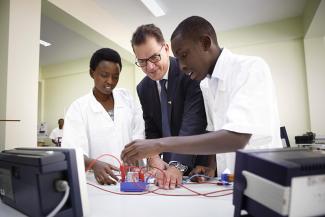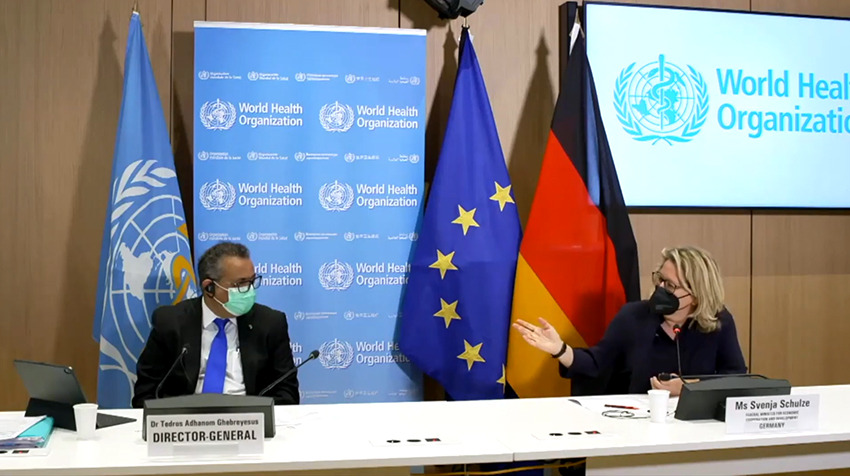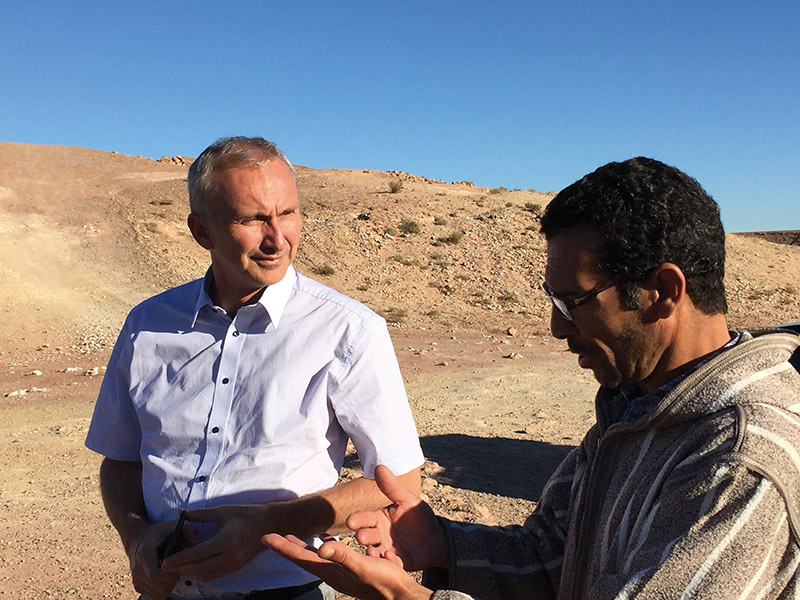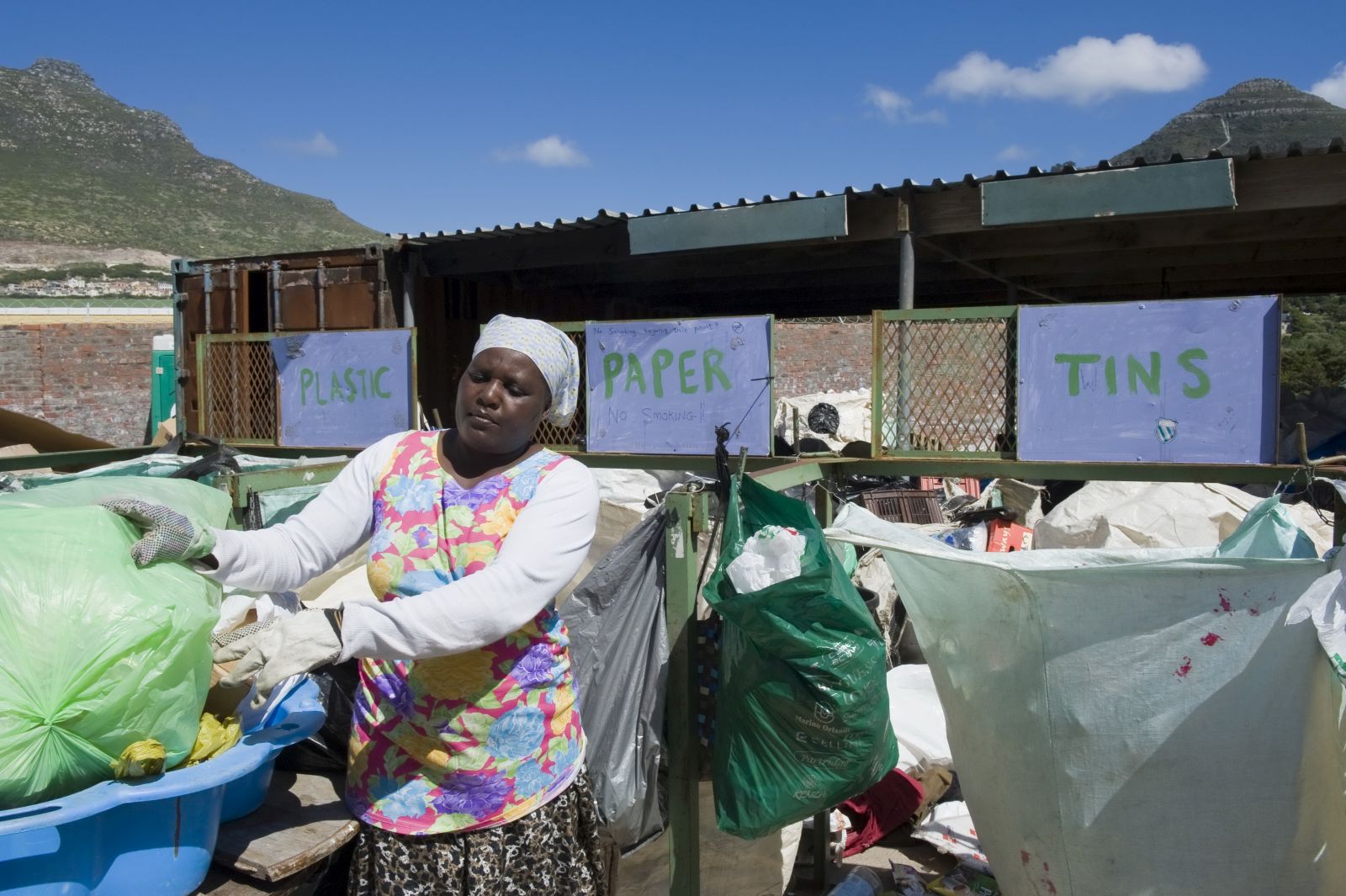EU Council presidency
Investing in the future

We all are Europe. Every global problem that we do not help to solve eventually becomes a European problem. Global challenges such as climate change, population growth and increasing migration require European responses. Moreover, we see ourselves confronted by new geopolitical alliances, and in many places faith is dwindling in the multilateral system’s problem-solving capacity.
In these circumstances, Germany will assume the presidency of the EU Council for six months on 1 July 2020. As Germany is Europe’s political and economic heavyweight, much is expected of us.
We intend to grasp the opportunity and contribute to shaping Europe’s foreign relations, not least in terms of adopting a future-oriented development policy. The European Union must rise to its global responsibility. It will be held accountable for good partnerships with our neighbours, equitably shaped globalisation and fighting climate change. I am actively championing this agenda. Our response to the global challenges must not be less, but rather “more EU“.
A new partnership with Africa
Nowhere are the opportunities and challenges of our era more evident than in Africa. With a huge potential of young people, commodities and renewable energies, our neighbouring continent will play a large role in determining our future. By 2050, Africa’s gross domestic product may actually exceed those of the EU and the USA combined. Apart from the shifting global balance of power, this is one reason why competition over Africa and in Africa is becoming ever more intensive.
Europe needs a new deal with Africa to build the future, and to follow on from the Cotonou Agreement. In this context, I welcome the fact that Ursula von der Leyen, the new commission president, has announced as a top priority the drafting of a new and comprehensive Africa strategy.
During our Council presidency, we want to contribute to the relaunch of the EU’s Africa policy. Germany’s international development policy offers good starting points. By launching the Marshall Plan with Africa, I have initiated a paradigm shift in cooperation with Africa. Taking our lead from the African Union’s Agenda 2063, we are focusing our support on reform-minded governments with an eye to improving governance in areas such as the rule of law, transparency and fighting corruption.
By promoting such causes, we are creating the environment for the private sector to invest sustainably, generate more employment and build something like an African “Mittelstand”, similar to the small and medium-sized enterprises that mark the German economy. At the same time, we are leveraging private investments by means of our newly established development investment fund (“Entwicklungsinvestitionsfonds”), which will make up to € 1 billion available to European and African enterprises.
The Compact with Africa, an initiative started under the German G20 presidency, takes the same approach. The Africa summit in Berlin in November showed what can grow out of this new quality of cooperation with Africa. Several investment agreements were signed with the involvement of international organisations and companies.
That kind of experience will inspire our proposals for a new and comprehensive European Africa policy.
Equitable globalisation
If Europe is to become a stronger player in global affairs, it must lead the way towards making globalisation more equitable. At the start of every value chain there are people who need to be able to earn a living through their work. We need social and environmental standards that apply throughout international value chains and supply chains.
Private-sector businesses bear some of the responsibility for making this happen. Accordingly, we must pass European regulations to protect trailblazing companies and ensure a level playing field. Businesses that safeguard human rights must not be put at a competitive disadvantage.
Free trade is an important precondition for growth and prosperity. Growth, however, will not be sustainable unless trade is not only free, but equitable too. The EU would do well to include binding and uniform sustainability standards in all comprehensive free-trade agreements.
Tariff concessions should only be granted if goods (palm oil, for example) are produced in a sustainable manner.
On top of this, the EU must remove all remaining trade barriers such as tariffs, quotas and non-tariff barriers, so African economies – and particularly North African ones – can become competitive. The priorities include high-quality infrastructure, education and vocational training.
Environmental protection and innovation
To an unprecedented extent, human-made climate change and environmental depletion are now threatening prosperity, standards of living and peace. Therefore, Europe must commit unambiguously in the 21st century to a policy of sustainability – and set an example by implementing it.
Europe must become climate neutral by 2050. The EU has to assume a leading role in regard to climate protection in order to have the credibility to demand equivalent efforts from emerging markets and developing countries. For good reason, Commission President Ursula von der Leyen has announced a “European Green Deal”. This Green Deal, however, will have to involve our partner countries because only joint action will allow us to fight climate change successfully.
Africa’s enormous dynamism offers the opportunity to choose climate-friendly, sustainable development trajectories right from the start. Africa must play a decisive role if climate change is to be contained and development is to become sustainable in environmental, economic and social terms.
For these reasons, our development cooperation supports African countries in building renewable energy systems. Africa can become the “green continent” by tapping its huge potential for wind, solar and bio energies. The European Union’s development cooperation should make such leapfrogging feasible.
At the same time, our cooperation – ranging from infrastructure construction to agriculture – must address the impacts of climate change that are being felt already, so people still have prospects. One aspect of the European-African Green Deal is that we are campaigning for an ambitious climate-finance target for the years after 2025 and we want the broad-based involvement of donor governments. We have a long-term duty to support our partners in developing countries in regard to financing the mitigation and adaptation efforts that climate change requires.
In this setting, we must invest more heavily in innovation. Generating green hydrogen with solar power from African deserts, for instance, would help to solve climate and energy problems, and it would contribute to generating jobs and improving people’s prospects in Africa. Block chain technology can be used for digitised administration and customs procedures; drones can deliver pharmaceuticals to remote areas. Quantum leaps are possible due to digitalisation. We must tap that potential to drive development. The European Union with its high standards, for example in regard to data privacy, can create the right framework.
Strong structures, sustainable financing
One thing is sure: changing track towards a policy of global sustainability will require institutional and structural innovation, and it will cost money. But it is an investment in our future!
Preparing the EU for a stronger role in tackling global challenges also requires additional earmarks in the EU’s Multiannual Financial Framework for the years 2021 to 2027. It makes sense to increase the funding for migration matters.
That is the kind of increase we also need for cooperation with Africa. So far, such funding is only set to rise from € 5 billion to € 6 billion per annum. By contrast, we keep paying ten times as much for the EU’s common agricultural policy. We need to invest much more in international development. Migration will not be reduced unless people find prospects in their home countries, and that requires education, jobs and incomes. At the same time, it is essential to gear development to climate protection.
The new partnership with Africa; tangible proposals for more equitable globalisation; more innovation in climate and environmental protection; coherent and sustainable funding: Germany will promote these causes during its EU Council presidency in the second half of 2020 with an eye to boosting European development policy. Our vision is to turn Europe into a global force for peace and sustainability.
Gerd Müller is Germany’s federal minister for economic cooperation and development.
http://www.bmz.de/en












